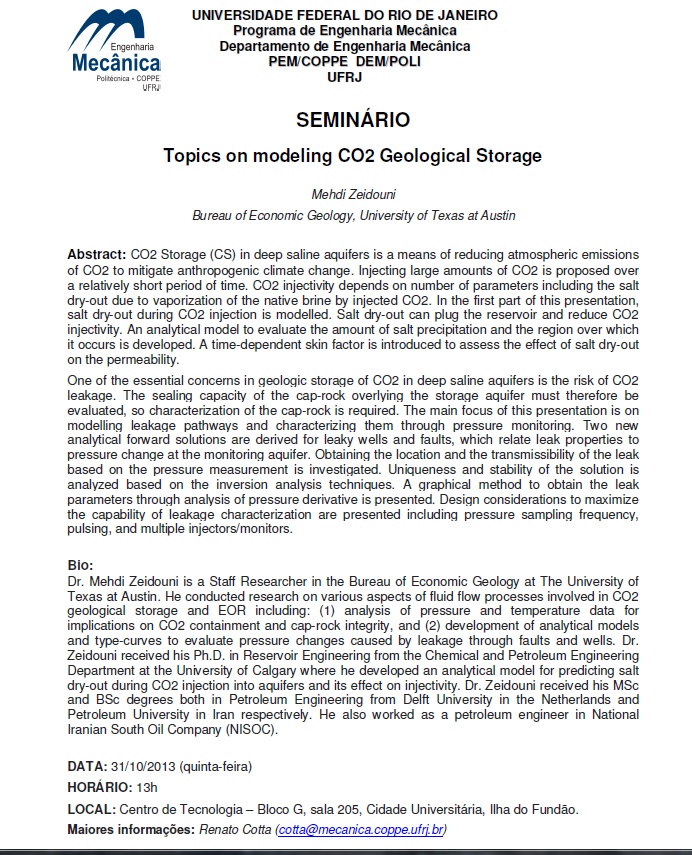Palestrante: Dr. Mehdi Zeidouni
Bureau of Economic Geology, University of Texas at Austin
DATA: 31/10/2013 (quinta-feira)
HORÁRIO: 13h
LOCAL: Centro de Tecnologia – Bloco G, sala 205, Cidade Universitária, Ilha do Fundão.
Maiores informações: Renato Cotta (This email address is being protected from spambots. You need JavaScript enabled to view it.)
Abstract: CO2 Storage (CS) in deep saline aquifers is a means of reducing atmospheric emissions of CO2 to mitigate anthropogenic climate change. Injecting large amounts of CO2 is proposed over a relatively short period of time. CO2 injectivity depends on number of parameters including the salt dry-out due to vaporization of the native brine by injected CO2. In the first part of this presentation, salt dry-out during CO2 injection is modelled. Salt dry-out can plug the reservoir and reduce CO2 injectivity. An analytical model to evaluate the amount of salt precipitation and the region over which it occurs is developed. A time-dependent skin factor is introduced to assess the effect of salt dry-out on the permeability.
One of the essential concerns in geologic storage of CO2 in deep saline aquifers is the risk of CO2 leakage. The sealing capacity of the cap-rock overlying the storage aquifer must therefore be evaluated, so characterization of the cap-rock is required. The main focus of this presentation is on modelling leakage pathways and characterizing them through pressure monitoring. Two new analytical forward solutions are derived for leaky wells and faults, which relate leak properties to pressure change at the monitoring aquifer. Obtaining the location and the transmissibility of the leak based on the pressure measurement is investigated. Uniqueness and stability of the solution is analyzed based on the inversion analysis techniques. A graphical method to obtain the leak parameters through analysis of pressure derivative is presented. Design considerations to maximize the capability of leakage characterization are presented including pressure sampling frequency, pulsing, and multiple injectors/monitors.
Bio:
Dr. Mehdi Zeidouni is a Staff Researcher in the Bureau of Economic Geology at The University of Texas at Austin. He conducted research on various aspects of fluid flow processes involved in CO2 geological storage and EOR including: (1) analysis of pressure and temperature data for implications on CO2 containment and cap-rock integrity, and (2) development of analytical models and type-curves to evaluate pressure changes caused by leakage through faults and wells. Dr. Zeidouni received his Ph.D. in Reservoir Engineering from the Chemical and Petroleum Engineering Department at the University of Calgary where he developed an analytical model for predicting salt dry-out during CO2 injection into aquifers and its effect on injectivity. Dr. Zeidouni received his MSc and BSc degrees both in Petroleum Engineering from Delft University in the Netherlands and Petroleum University in Iran respectively. He also worked as a petroleum engineer in National Iranian South Oil Company (NISOC).
